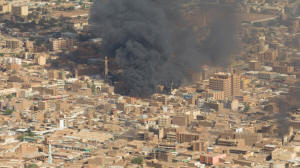Air strikes, artillery fire escalate as factions battle in Sudan capital
 Send a link to a friend
Send a link to a friend
 [May 16, 2023]
By Khalid Abdelaziz [May 16, 2023]
By Khalid Abdelaziz
DUBAI (Reuters) -Air strikes and artillery fire intensified sharply
across Sudan's capital early on Tuesday, residents said, as the army
sought to defend key bases from paramilitary rivals it has been fighting
for more than a month.
The air strikes, explosions and clashes could be heard in the south of
Khartoum, and there was heavy shelling across the River Nile in parts of
the adjoining cities of Bahri and Omdurman, witnesses said.
The fighting between the army and the paramilitary Rapid Support Forces
(RSF) has triggered unrest in other areas of Sudan, especially in the
western region of Darfur, but is concentrated in Khartoum.
It has caused a humanitarian crisis that threatens to destabilise the
region, displacing more than 700,000 people inside Sudan and forcing
about 200,000 to flee into neighbouring countries.
Those who have remained in the capital are struggling to survive as food
supplies dwindle, health services collapse and lawlessness spreads.
Officials have recorded 676 deaths and more than 5,500 injuries, but the
real toll is expected to be far higher with many reports of bodies left
in the streets and people struggling to bury the dead.

"The situation is unbearable. We left our house to go to a neighbour's
house in Khartoum, escaping from the war, but the bombardment follows us
wherever we go," said Ayman Hassan, a 32-year-old resident.
"We don't know what the citizens did to deserve a war in the middle of
the houses."
JEDDAH TALKS
Fighting has surged both in Khartoum and in Geneina, capital of West
Darfur, since the two warring parties began talks in Jeddah brokered by
Saudi Arabia and the United States more than a week ago.
The talks have produced a statement of principles about providing access
for aid supplies and protecting civilians, but mechanisms for setting up
humanitarian corridors and agreeing to a ceasefire are still being
discussed.
Both sides had previously announced several ceasefires, none of which
stopped the fighting.
The army has relied largely on air strikes and shelling, only
occasionally engaging in ground fighting, as it seeks to push back RSF
forces that took up positions in neighbourhoods across Khartoum soon
after the fighting erupted on April 15.
The RSF attacked major military bases in northern Omdurman and southern
Khartoum on Tuesday in an apparent attempt to prevent the army from
deploying heavy weaponry and fighter jets, residents and witnesses said.
[to top of second column]
|

A screen grab shows black smoke and fire
at Omdurman market in Omdurman, Sudan, May 15, 2023. VIDEO OBTAINED
BY REUTERS/Handout via REUTERS

The RSF also said in a statement that it had captured hundreds of
army troops in a counter attack in Bahri, releasing a video of rows
of men in uniform sitting on the ground as RSF fighters celebrated
around them. Reuters could not immediately verify the claim, which
the army denied.
The army has been trying to cut off RSF supply lines from outside
the capital and to secure strategic sites including the airport in
central Khartoum and the major Al-Jaili oil refinery in Bahri, where
fighting flared again on Tuesday.
HOMES DESTROYED
The war began after disputes over plans for the RSF to join the army
and the future chain of command under an internationally backed deal
for a political transition towards civilian rule and elections.
Army chief General Abdel Fattah al-Burhan and RSF commander Mohamed
Hamdan Dagalo, known as Hemedti, took the top positions on Sudan's
ruling council following the 2019 overthrow of former leader Omar
al-Bashir during a popular uprising.
They staged a coup two years later as a deadline to hand power to
civilians approached, but both sides began to mobilise their forces
as mediators tried to finalise the transition plan.
Both sides courted foreign backing from regional states attracted by
Sudan's mineral and agricultural wealth, and its strategic location
between the Sahel and the Gulf.
Most of those fleeing Sudan have headed north to Egypt or west to
Chad, which borders Darfur. Others have headed to Port Sudan on the
Red Sea, hoping to catch boats to Saudi Arabia.

"We came from war, we lost our husbands, our homes were destroyed,"
said Reem, a student camped out in scorching heat in Port Sudan with
hundreds of others. "Even if there were peace, where are we going to
live if we go back?"
(Reporting by Khalid Abdelaziz; Writing by Aidan Lewis; Editing by
Andrew Heavens, Nick Macfie, William Maclean)
[© 2023 Thomson Reuters. All rights
reserved.]This material may not be published,
broadcast, rewritten or redistributed.
Thompson Reuters is solely responsible for this content. |